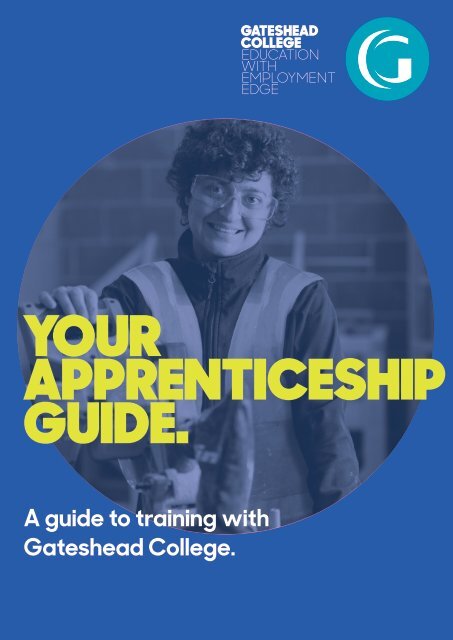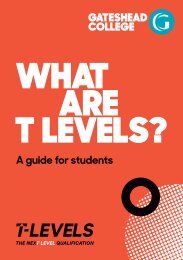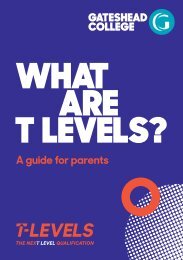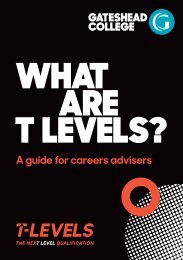Apprenticeship Handbook 2023/24
Create successful ePaper yourself
Turn your PDF publications into a flip-book with our unique Google optimized e-Paper software.
YOUR<br />
APPRENTICESHIP<br />
GUIDE.<br />
A guide to training with<br />
Gateshead College.
CONTENTS.<br />
1. Hello<br />
2. About your apprenticeship<br />
Standards<br />
Qualification<br />
Employer involvement<br />
20% off the job learning<br />
End-point assessment<br />
How apprentices are assessed<br />
3. Your apprenticeship journey<br />
4. Who does what?<br />
What you’ll do<br />
What we’ll do<br />
What your employer will do<br />
5. Your campus<br />
6. Here for you<br />
Help and support for apprentices<br />
Not going to be in? (Absence)<br />
Appeals procedure<br />
7. Keeping you safe<br />
Health and safety<br />
Safeguarding<br />
8. Have your say<br />
Feedback<br />
2
1.<br />
HELLO.<br />
HUGE<br />
CONGRATULATIONS<br />
ON GAINING<br />
YOUR<br />
APPRENTICESHIP.<br />
<strong>Apprenticeship</strong>s are a great way for<br />
you to get essential on-the-job skills<br />
and a recognised qualification while<br />
earning a wage.<br />
We’ll be working with you on the<br />
‘off-the-job’ part of your<br />
apprenticeship. You’ll receive<br />
up to date training and gain the<br />
knowledge, skills and behaviours you<br />
need to succeed in your<br />
chosen career.<br />
What you do and achieve at<br />
Gateshead College will have an<br />
impact on the rest of your life, so we<br />
hope you enjoy your time with us<br />
and make the most of it. We’ll help<br />
you by providing you with fantastic<br />
teaching, facilities and support.<br />
It’s hard work, but you’ll enjoy it.<br />
And we’ll put in everything we’ve got<br />
to make sure you succeed.<br />
Good luck!<br />
David Alexander<br />
Principal and Chief Executive<br />
3
2.<br />
ABOUT YOUR<br />
APPRENTICESHIP.<br />
Your apprenticeship<br />
has been designed by<br />
employers who have<br />
developed a set of<br />
standards that reflect the<br />
needs of their industry.<br />
That means, whatever<br />
your apprenticeship, you’ll<br />
be getting the skills and<br />
knowledge that will give you<br />
the edge in the workplace.<br />
As an apprentice, you’ll either<br />
already be employed or you’ll<br />
start working for an employer<br />
where you’ll be trained to do a<br />
specific role. When you finish<br />
your apprenticeship you’ll have a<br />
fantastic set of skills and hands-on<br />
work experience to put on your CV.<br />
Throughout you’re programme,<br />
you’ll learn and be measured<br />
against the knowledge, skills<br />
and behaviours set out in the<br />
apprenticeship standard. You’ll then<br />
complete an end-point assessment<br />
to confirm your competence.<br />
You can find all published<br />
apprenticeship standards here.<br />
Your apprenticeship standard<br />
consists of:<br />
English and maths (functional skills)<br />
To successfully complete your<br />
apprenticeship, you’ll need to<br />
achieve a Level 2 in English and<br />
maths, that’s the equivalent of<br />
GCSE Grade C-A* or 4-9. If you’ve<br />
previously achieved an English and<br />
maths qualification you may be<br />
exempt - your trainer/assessor will<br />
confirm this at enrolment.<br />
We’ll support you to improve your<br />
English and maths throughout your<br />
training with us and your employer<br />
will provide lots of opportunities<br />
to apply your learning in the<br />
workplace.<br />
A recognised qualification<br />
Some apprenticeship standards<br />
don’t include a mandatory<br />
qualification, but at Gateshead<br />
College we encourage our<br />
apprentices to complete one<br />
wherever possible. That way, you’re<br />
not only getting your apprenticeship<br />
standard, you’re also getting an<br />
industry-relevant qualification.<br />
Employer involvement<br />
Your employer’s involvement and<br />
input throughout every step of<br />
your apprenticeship is key. They’ll<br />
link in what you’re learning on your<br />
apprenticeship with your day-today<br />
job, so you have opportunities<br />
to practise and master new skills,<br />
apply your new knowledge and<br />
develop your behaviours. Working<br />
with your trainer/assessor, your<br />
employer will be fully involved in<br />
progress reviews, target setting,<br />
achieving milestones and career<br />
planning.<br />
4
I’ll be training on-thejob<br />
alongside other<br />
apprentices and the<br />
company’s expert<br />
engineering teams, to<br />
develop the specialist<br />
skills needed to start, and<br />
future-proof my career.<br />
Melissa Millington<br />
Go North East Apprentice<br />
5
20% off-the-job learning<br />
You’ll spend 6 hours per week of your<br />
apprenticeship off-the-job. This is<br />
the time you will spend away from<br />
your normal day to day duties (but<br />
not necessarily away from your<br />
place of work) where you’ll complete<br />
learning activities to enable you to<br />
achieve your apprenticeship.<br />
You’ll be provided with an off-thejob<br />
training plan at the start of<br />
your apprenticeship and you’ll be<br />
responsible for keeping a record<br />
of your activities and hours.<br />
Off the job learning includes many<br />
things, some of them are obvious such<br />
as attending college or workshops,<br />
completing workbooks and preparing<br />
for your trainer/assessor meetings.<br />
Directed learning from Gateshead College:<br />
Independent learning:<br />
Others are less obvious but still very<br />
important learning opportunities, this<br />
might include attending meetings,<br />
internal training, coaching from a<br />
colleague or manager, learning a<br />
new IT system, reading instructions or<br />
trade papers, research on the internet,<br />
undertaking projects, creating reports or<br />
practicing new skills in the workplace.<br />
The graphic opposite demonstrates<br />
off-the-job learning activities:<br />
Employer-led learning activities:<br />
Application of learning:<br />
6
●<br />
●<br />
●<br />
●<br />
●<br />
●<br />
●<br />
●<br />
Day release and workshops<br />
1:1 coaching and support<br />
Training<br />
Assessment feedback and guidance<br />
Revision sessions<br />
Attending webinars<br />
Project work<br />
Observational feedback<br />
●<br />
●<br />
●<br />
●<br />
●<br />
●<br />
●<br />
●<br />
●<br />
Reading books and study guides<br />
Independent research<br />
Workbooks<br />
Trainer/assessor-led independent research<br />
Reading trade journals, magazines and webinars<br />
Preparing and planning for exams, assessment and presentations<br />
Writing assignments<br />
Online learning<br />
Completing portfolio work and knowledge questions<br />
●<br />
●<br />
●<br />
●<br />
●<br />
●<br />
●<br />
●<br />
Employer induction training<br />
Internal training courses<br />
Employer policies and procedures<br />
Mentoring<br />
Shadowing<br />
Learning from others and peer discussions<br />
Meetings with stakeholders and suppliers<br />
Conferences, trade exhibitions and events<br />
●<br />
●<br />
●<br />
●<br />
Practising new skills<br />
Reflective activity<br />
Planning<br />
Revision<br />
Does not count as<br />
off-the-job learning:<br />
● Progress reviews<br />
● Undertaking exams<br />
● Study towards English and<br />
maths functional skills<br />
● Training that is not linked<br />
to the apprenticeship<br />
● Learning that is not new<br />
7
End-point assessment (EPA)<br />
End-point assessment (EPA) is the<br />
final external assessment which tests<br />
the knowledge, skills and behaviours<br />
you’ve gained during your training.<br />
Unique to each standard, EPA<br />
demonstrates your competency in<br />
your role. This competence is valued<br />
by current and future employers.<br />
Throughout your apprenticeship<br />
we’ll help to prepare you for your<br />
end-point assessment through<br />
coaching, practice activities and<br />
mock tests. The outcome of your<br />
end-point assessment will be<br />
graded as either Pass, Merit or<br />
Distinction (this may vary depending<br />
on the apprenticeship standard).<br />
This grade will appear on your<br />
final apprenticeship certificate.<br />
PlanBEE has given me the chance to<br />
learn about and try lots of different<br />
roles within construction and that’s<br />
helped me to land a job with Tolent.<br />
It’s given me the best start in the<br />
industry.<br />
Luke Oldfield<br />
Former PlanBEE Aprentice,<br />
Site Manager at GMI Construction<br />
Group<br />
8
How apprentices are assessed:<br />
Portfolio<br />
On-programme portfolio<br />
EPA portfolio<br />
Evidence logbook<br />
Professional discussion<br />
Open discussion<br />
Closed discussion<br />
Practical assessment<br />
Task-based pick-n-mix option<br />
Set task-based challenge<br />
Technical skills test<br />
Practical assessment test<br />
Technical specialist simulation<br />
Observation<br />
Simulated observation<br />
Employer observation report<br />
Competency activity<br />
observation<br />
Recorded role play<br />
Interview<br />
Panel Interview<br />
Question and answer session<br />
Employer technical competency<br />
validation interview<br />
Employer’s competency<br />
interview<br />
Written Test or MCQ<br />
Multiple Choice Questionnaire<br />
(MCQ)<br />
Open response<br />
Situational judgement tests<br />
Scenario tests<br />
Industry/trade tests<br />
Online behavioural test<br />
Project<br />
Optional route project<br />
Practical<br />
Synoptic practical project<br />
Employer set project<br />
Assignment<br />
project<br />
Learner Log<br />
Learner’s experience log<br />
Employer’s observation<br />
report log<br />
Training log book<br />
Reflective journal<br />
Behavioural log<br />
Skills record log<br />
Professional<br />
development log<br />
Reflective log<br />
Showcase/Presentation<br />
Showcase<br />
Project presentation<br />
Scenario case study<br />
Report presentation<br />
9
3.<br />
YOUR APPRENTICESHIP<br />
JOURNEY.<br />
Initial assessment<br />
To make sure you get<br />
the best experience on<br />
your apprenticeship<br />
programme, we’ll ask you<br />
to complete a maths and<br />
English initial assessment<br />
and an occupational skill<br />
scan. They’ll help us to<br />
understand your existing<br />
knowledge and skills so<br />
we can provide you with<br />
tailored learning and<br />
support<br />
Induction<br />
You’ll complete an<br />
induction to your<br />
Gateshead College<br />
apprenticeship so you’ve<br />
all the information you<br />
need before starting your<br />
training with us. At your<br />
induction day you’ll receive<br />
your individual training<br />
plan. We’ll also provide you<br />
with advice and guidance<br />
on your apprenticeship<br />
programme, clarify<br />
expectations and highlight<br />
the support available<br />
to you during your<br />
apprenticeship.<br />
Individual training plan<br />
You’ll receive your<br />
individual training plan at<br />
your college induction.<br />
It is a route map of how<br />
you’ll progress from your<br />
starting point on your<br />
learning journey through<br />
to successful completion<br />
of your apprenticeship<br />
programme. You’ll be<br />
measured against some<br />
target key milestones<br />
which enable your trainer/<br />
assessor to monitor and<br />
track your performance.<br />
You’ll receive specific<br />
guidance from your<br />
trainer/assessor on what<br />
you need to do to improve.<br />
Your plan is individual to<br />
you and reflects your<br />
goals, aspirations, aptitude<br />
and needs.<br />
Practical period<br />
This is the time spent<br />
training, learning,<br />
developing and practicing<br />
your knowledge, skills and<br />
behaviours towards the<br />
apprenticeship standard.<br />
The practical period lasts<br />
from enrolment through<br />
to the point which you are<br />
ready for your end-point<br />
assessment.<br />
Your progress will be<br />
tracked and monitored<br />
against key milestones to<br />
ensure you’re performing<br />
against your targets.<br />
During your practical<br />
period you might also<br />
complete learning towards<br />
your functional skills in<br />
English, maths and IT and<br />
complete your functional<br />
skills exams.<br />
10
Progress reviews<br />
Reviews will take place<br />
at least every 12 weeks.<br />
You’ll have the opportunity<br />
to discuss your progress<br />
and any concerns, gain<br />
feedback and agree long<br />
and short-term targets<br />
for the completion of your<br />
qualification. It’s also an<br />
opportunity to talk through<br />
how you’re progressing<br />
towards your career plans<br />
and goals.<br />
You’ll discuss how you’ll<br />
link your training to your<br />
job role. This will be done<br />
with you, a member of our<br />
team and your workplace<br />
mentor.<br />
Gateway<br />
The term gateway is<br />
when you have passed<br />
all qualifications included<br />
in your apprenticeship<br />
and you, your employer<br />
and the college decides<br />
you’re ready for the endpoint<br />
assessment. They’ll<br />
consult with your trainer/<br />
assessor and, when they<br />
feel you’re competent<br />
and have completed your<br />
mandatory qualifications,<br />
they’ll ‘open the gate’<br />
to your end-point<br />
assessment.<br />
Some apprenticeship<br />
standards have multiple<br />
gateways throughout the<br />
apprenticeship. You must<br />
pass each gateway to<br />
move to the next stage.<br />
End-point assessment (EPA)<br />
This is your final<br />
assessment to ensure<br />
that you can do the job<br />
you’ve been training<br />
for. It’s carried out by an<br />
external independent<br />
end-point assessment<br />
organisation.<br />
Completion, certification<br />
and progression<br />
You have passed your<br />
end-point assessment and<br />
will receive your end-point<br />
assessment certificate<br />
including your grade. You’ll<br />
also receive certificates<br />
for any other qualifications<br />
you have achieved.<br />
You’ll complete an exit<br />
interview with your trainer/<br />
assessor who will provide<br />
you with information,<br />
advice and guidance<br />
around your next steps.<br />
Employment edge<br />
We'll give you the employment edge by equipping you<br />
with the knowledge, behaviours and skills you need to<br />
be successful in your chosen career.<br />
To achieve this we'll work with you and your<br />
employer to ensure you receive impartial, quality<br />
career guidance throughout the duration of your<br />
apprenticeship.<br />
11
4.<br />
WHO DOES<br />
WHAT?<br />
Your main contacts during your apprenticeship:<br />
Trainer/assessor<br />
A subject specialist who will support<br />
you throughout your apprenticeship<br />
journey through:<br />
● Inducting you onto your<br />
apprenticeship , including<br />
arranging any additional<br />
support needs you may have<br />
●<br />
●<br />
●<br />
●<br />
●<br />
Monitoring and reviewing<br />
progress towards each element<br />
of your apprenticeship as well<br />
as general welfare support<br />
Liaising with your employer<br />
Provide specific skill and<br />
knowledge teaching or training<br />
Preparing you for<br />
end-point assessment<br />
Ongoing careers advice<br />
and guidance<br />
Teacher<br />
Some of our apprentices come<br />
to college for day release and<br />
complete their sessions with one of<br />
our experienced teachers.<br />
12<br />
Internal verifier<br />
A member of the Gateshead<br />
College team, the Internal verifier<br />
checks the quality of work which<br />
has been assessed and approved<br />
by the trainer/assessor/teacher/<br />
tutor to ensure it meets the<br />
requirements of the apprenticeship<br />
standard or the qualification<br />
undertaken as part of the<br />
apprenticeship standard.<br />
Employer mentor<br />
The person in your workplace<br />
responsible for supporting you<br />
throughout your apprenticeship.<br />
This person will ensure you receive<br />
adequate opportunities to practice<br />
what you have learned in the<br />
workplace.
We want you to get the most out of your apprenticeship<br />
so it’s important that you understand what you are<br />
responsible for and, likewise, what your employer and<br />
Gateshead College take responsibility for.<br />
You’re responsible for:<br />
●<br />
Complying with all policies and procedures<br />
outlined in the commitment statement,<br />
which we’ll give you at induction.<br />
●<br />
●<br />
●<br />
●<br />
●<br />
●<br />
●<br />
●<br />
●<br />
Observing your employer’s terms<br />
and conditions of employment.<br />
Attending all off-the-job training sessions, day<br />
release, scheduled training and workshops,<br />
planned assessment visits and progress review<br />
meetings required to achieve the apprenticeship.<br />
(Inform your employer and Gateshead College<br />
(in advance if possible) of any non-attendance.)<br />
Spending a minimum of 6 hours per week<br />
off-the-job training over the duration of<br />
the apprenticeship as set out in the off the<br />
job training plan agreed at enrolment.<br />
Committing to the learning activities required<br />
during the apprenticeship, including any additional<br />
self-study (to take place during working hours).<br />
Keeping an up-to-date record and evidence<br />
of all off-the-job learning that occurs (in<br />
college and in the workplace) for the duration<br />
of the apprenticeship, using the systems and<br />
processes set out by Gateshead College.<br />
Ensuring all coursework, assignments and<br />
exams required to complete each component<br />
of your apprenticeship are achieved and<br />
submissions are made in a timely manner.<br />
Take an active role in reviewing targets and<br />
progress towards your apprenticeship during 9<br />
weekly progress review meetings held with your<br />
employer and a Gateshead College representative.<br />
Informing your employer and Gateshead College<br />
of any issues which may affect your plan of training<br />
and the achievement of your apprenticeship.<br />
Agreeing, with your employer and<br />
Gateshead College, when you’re ready<br />
to take your end-point assessment.<br />
The apprentice route gives you<br />
independence and financial security;<br />
it is also a great way to get into a<br />
successful company like Essity.<br />
Amber Megan<br />
Essity Apprentice<br />
13
Gateshead College is responsible for:<br />
●<br />
●<br />
●<br />
●<br />
●<br />
●<br />
●<br />
●<br />
●<br />
Ensuring that a contract of employment and<br />
apprenticeship agreement is in place between you<br />
and your employer that covers the duration of the<br />
apprenticeship (including end-point assessment).<br />
Ensuring you are being paid a lawful wage.<br />
Ensuring you are employed in a safe working<br />
environment in line with health and safety,<br />
safeguarding and equality and diversity legislation.<br />
Carrying out suitable checks to ensure<br />
you are in the right job role to enable you<br />
to practice skills in the workplace relating<br />
to the knowledge, skills and behaviours set<br />
out in your apprenticeship programme.<br />
Delivering high quality training and<br />
assessment, appropriate to the requirements<br />
of the apprenticeship qualification in<br />
a timely and efficient manner.<br />
Ensuring all parties are aware of the minimum<br />
requirement of 20% off-the-job training over the<br />
duration of the apprenticeship and all off-the-job<br />
training must be carried out during working hours.<br />
Providing you and your employer with an offthe-job<br />
training plan during enrolment.<br />
Ensuring you have suitable support and<br />
supervision (including necessary personal<br />
protective equipment (PPE) and specific training<br />
for use of specialised equipment) during your<br />
apprenticeship and a named employer contact<br />
who is responsible for your safety and welfare.<br />
Devising an individual plan of training which<br />
considers; an initial assessment of your pre-existing<br />
knowledge, skills and behaviours against those<br />
required to achieve the apprenticeship, your<br />
current English and maths working level, learning<br />
support requirements and minimum off-the-job<br />
training requirements.<br />
●<br />
Providing off-the-job training as detailed in the offthe-job<br />
training plan to a high standard including:<br />
▪<br />
▪<br />
▪<br />
▪<br />
▪<br />
▪<br />
▪<br />
▪<br />
▪<br />
An induction to the apprenticeship<br />
that explains the plan of training<br />
Providing appropriate learning<br />
resources and materials<br />
Track and report non-attendance at<br />
scheduled training sessions, day release,<br />
workshops, assessment visits and progress<br />
review meetings to the employer<br />
Ensure the quality of delivery through regular<br />
observations of teaching and learning<br />
and apprentice/employer feedback<br />
Ensure you are visited in your place of work<br />
every 6 to 8 weeks and more frequently<br />
where required and agreed by all parties.<br />
Monitor, through the 12 weekly progress<br />
review process, your performance and<br />
progress in all aspects of your work and<br />
apprenticeship. Ensuring your employer is<br />
fully involved and engaged in this process.<br />
Agree with you and your employer when<br />
learning is complete, and you are ready<br />
to undertake end-point assessment.<br />
Provide certification as agreed by<br />
you and your employer and/or<br />
required by the apprenticeship.<br />
Resolving any assessment appeals<br />
or complaints in line with Gateshead<br />
College procedures<br />
14
Your employer is responsible for:<br />
●<br />
●<br />
●<br />
Working with Gateshead College to<br />
identify the most suitable apprenticeship<br />
standard that matches your job role.<br />
Providing you with a fair and safe working<br />
environment which complies with<br />
health and safety, equality and diversity<br />
(including the promotion of British Values),<br />
safeguarding and Prevent legislation.<br />
Providing you with a contract of employment<br />
in line with the Employment Rights Act 1996<br />
ensuring you are paid at least the national<br />
minimum wage. (Apprentices who are under<br />
19, or over 19 and in the first year of their<br />
apprenticeship can be paid at least the national<br />
minimum wage for apprentices, click here.)<br />
▪<br />
▪<br />
▪<br />
▪<br />
Working with Gateshead College<br />
to select the most appropriate endpoint<br />
assessment organisation.<br />
Supporting you towards your<br />
end-point assessment.<br />
Agreeing with you and Gateshead College<br />
when you are ready for end-point assessment.<br />
Allowing you the required time away from<br />
work to take end-point assessment.<br />
●<br />
●<br />
●<br />
●<br />
●<br />
●<br />
●<br />
●<br />
●<br />
●<br />
Contributing to and agreeing the plan and method<br />
of training as developed by Gateshead College.<br />
Ensuring you have the opportunity, resources<br />
and facilities in your job role to practice new skills<br />
and gain the knowledge, skills and behaviours<br />
needed to achieve the apprenticeship.<br />
Ensuring you have appropriate support<br />
and supervision to carry out your job role<br />
including a named employer contact<br />
responsible for your safety and welfare.<br />
Ensuring are given a minimum of 20% off-the-job<br />
training over the duration of the practical period,<br />
allowing the apprentice to attend Gateshead<br />
College or alternative delivery workshops as<br />
agreed at the start of the apprenticeship.<br />
Assisting Gateshead College in collecting<br />
evidence of off-the-job training.<br />
Ensuring all off the job training is<br />
completed during working hours.<br />
Ensuring functional skills are completed<br />
during working hours (if applicable).<br />
Reviewing your progress and performance both in<br />
the workplace and training every 9 weeks through<br />
a progress review meeting alongside a Gateshead<br />
College representative and the apprentice.<br />
Helping shape and support the delivery<br />
of careers advice and guidance<br />
throughout your apprenticeship.<br />
End-point assessment<br />
Our apprentices demonstrate<br />
enthusiasm, resilience and an ability<br />
to adapt to the changing needs of<br />
a small business and that’s what<br />
makes them so valuable.<br />
I’ve been able to give them more<br />
responsibility on the shop floor,<br />
which has allowed me to spend more<br />
time winning new customers.<br />
Garry Charlton<br />
Manager at Chips Away<br />
15
5.<br />
YOUR<br />
CAMPUS.<br />
Baltic Campus<br />
Training kitchens<br />
Botanica salon<br />
200-seat theatre<br />
Music recording studios<br />
Two floor learning centre<br />
Three restaurants<br />
Starbucks<br />
Science labs<br />
Relaxed social spaces<br />
How do I get there?<br />
Quarryfield Road<br />
Baltic Business Quarter<br />
Gateshead<br />
NE8 3BE<br />
0191 490 0300<br />
Go North East buses 53/54 and<br />
93/94 go direct to Baltic campus.<br />
Bus routes from across the region<br />
go to Gateshead Interchange,<br />
just 10 minutes walk away.<br />
Free car parking at all campuses.<br />
Just ten minutes walk from<br />
Gateshead Interchange.<br />
16
Academy for Sport<br />
83m indoor athletics track<br />
4G artificial and grass pitches<br />
Boxing suite<br />
Olympic standard gym<br />
Pole vault, long jump and<br />
throw area<br />
Sports science and medicine<br />
facilities<br />
How do I get there?<br />
Neilson Road<br />
Gateshead<br />
NE10 0EF<br />
0191 490 <strong>24</strong>47<br />
The 93/94 Loop bus connects<br />
the Interchange to the Academy.<br />
Bus routes from across the<br />
region go to Gateshead<br />
Interchange.<br />
Free car parking at all campuses.<br />
Just 10 minutes walk from<br />
Gateshead International Stadium.<br />
17
Skills Academy for Construction<br />
Workshop space for each trade<br />
Relaxed social spaces with<br />
vending machines<br />
How do I get there?<br />
Eighth Avenue<br />
(off Kingsway South)<br />
Team Valley<br />
Gateshead<br />
NE11 0SX<br />
0191 490 4617<br />
The 93/94 Loop bus connects<br />
the Interchange to the Academy.<br />
Bus routes from across the<br />
region go to Gateshead<br />
Interchange.<br />
Free car parking at all campuses.<br />
The nearest Metro station to the<br />
Skills Academy for Construction<br />
is Gateshead Interchange.<br />
18
Skills Academy for Automotive,<br />
Engineering, Manufacturing & Logistics<br />
Mechanical maintenance<br />
workshops<br />
Welding and fabrication workshops<br />
Spray paint booths<br />
Rolling road<br />
Motor Vehicle workshops<br />
CNC and CAD machines<br />
Café<br />
How do I get there?<br />
Kingsway South<br />
Team Valley<br />
Gateshead<br />
NE11 0SU<br />
0191 490 <strong>24</strong>30<br />
The 93/94 Loop bus connects the<br />
Interchange to the Academy.<br />
Bus routes from across the<br />
region go to Gateshead<br />
Interchange.<br />
Free car parking at all campuses.<br />
The nearest Metro station to the<br />
Skills Academy for Automotive<br />
is Gateshead Interchange.<br />
19
Car Parks and Travel<br />
Whether you are travelling to one of<br />
our campuses on foot, by car or by<br />
using public transport, this section<br />
can help you find the easiest and<br />
cheapest routes.<br />
If you are aged 16 - 19 then check<br />
out the following websites for more<br />
information about tickets and<br />
discounts:<br />
www.simplygo.com<br />
www.stagecoachbus.com<br />
www.networkonetickets.co.uk<br />
www.arrivabus.co.uk<br />
For students with disabilities or<br />
learning difficulties (16–<strong>24</strong> years<br />
old) contact your Local Authority<br />
or visit www.nexus.org.uk for details<br />
about the TaxiCard scheme and<br />
concessionary travel for the most<br />
up to date travel information which<br />
can help you save time and money.<br />
Travel information<br />
For information on how<br />
to get to all four of our<br />
campuses visit<br />
www.gateshead.ac.uk/<br />
find-us<br />
Car Parks<br />
All college car parks are operated<br />
on a first come first served basis to<br />
all staff, students and visitors. They<br />
are well lit and constantly monitored<br />
via CCTV and by site services staff.<br />
Note, you park at your own risk and<br />
must adhere to the relevant terms<br />
and conditions of use for all car<br />
parks. Failure to do so may lead<br />
to parking charge notices. If you<br />
park outside of the college grounds<br />
please be considerate to local<br />
residents and make sure you are<br />
not parking in a restricted area, as<br />
traffic wardens do operate around<br />
college sites<br />
Baltic Campus car park<br />
This car park is operated by Excel<br />
Car Parking Services Ltd.<br />
There are 239 places including<br />
accessible, car share and visitor<br />
bays. 92 cycle bays and 16<br />
motorcycle bays are also available.<br />
You are required to have a virtual<br />
permit to access free parking.<br />
Car park permit<br />
Forms are available from Student<br />
Services and Reception. Complete<br />
the form and hand it to Student<br />
Services or Reception. The<br />
document will be processed and<br />
you will receive an email to inform<br />
you when your virtual car parking<br />
permit is in place.<br />
Academy for Sport<br />
This is a council run car park and<br />
stretches over 3 car park areas.<br />
You do not need to display a ticket.<br />
Cycle and motorcycle bays are<br />
available.<br />
Skills Academy for Automotive,<br />
Engineering, Manufacturing and<br />
Logistics<br />
65 places including accessible, car<br />
share and visitor bays. Cycle and<br />
motorcycle bays are also available.<br />
You’ll need a virtual permit to park<br />
here. Please complete a permit<br />
request form which is available from<br />
your campus reception. You’ll then<br />
receive an email confirming when<br />
your virtual permit is in place.<br />
Skills Academy for Construction<br />
52 places including accessible, car<br />
share and visitor bays. Cycle and<br />
motorcycle bays are also available.<br />
You’ll need a virtual permit to<br />
park at this site. Please complete<br />
a permit request form which<br />
is available from your campus<br />
reception. You’ll then receive an<br />
email confirming when your virtual<br />
permit is in place.<br />
All enquiries and comments relating<br />
to the car park should be made<br />
to Excel Car Parking Services Ltd<br />
at their office. Additional pay and<br />
display parking is available opposite<br />
the Baltic Campus car park, at<br />
Sage Gateshead and BALTIC<br />
Centre for Contemporary Art (close<br />
to the Baltic Campus).<br />
20
Your key contacts<br />
If someone needs to contact you<br />
in an emergency they need to call<br />
0191 490 0300. They will need to<br />
know the full title of your course, the<br />
year (1st or 2nd), and the name of<br />
your lecturer. Leave this information<br />
on a postcard in your house.<br />
General contacts<br />
0191 490 0300<br />
start@gateshead.ac.uk<br />
Call Centre:<br />
General course information<br />
0191 490 2<strong>24</strong>6<br />
Campus contact details<br />
Baltic Campus<br />
Reception 0191 490 22<strong>24</strong><br />
Information, Advice and<br />
Guidance Centre 0191 490 2227<br />
Academy for Sport,<br />
Gateshead International Stadium<br />
Reception 0191 490 2346<br />
Student Services 0191 490 <strong>24</strong>12<br />
One of the main things that stood out for<br />
me about apprenticeships is the fact you<br />
get hands-on learning as well as getting<br />
paid to learn.<br />
Jessica Dobie<br />
Supply Chain Practitioner Apprentice<br />
Sterling Pharma Solutions<br />
Skills Academy for Automotive,<br />
Engineering, Manufacturing and<br />
Logistics<br />
Reception 0191 490 <strong>24</strong>30<br />
Skills Academy for Construction<br />
Reception 0191 490 4617<br />
Student Services 0191 490 2204<br />
<strong>Apprenticeship</strong>s<br />
Employer support<br />
0191 4902258<br />
employers@gateshead.ac.uk<br />
or contact your trainer/assessor<br />
direct.<br />
Support Services<br />
Information, Advice & Guidance<br />
0191 490 2227<br />
Examination Office<br />
0191 490 2233/2232<br />
Learning Support Service<br />
0191 490 2253<br />
learner.support@gateshead.ac.uk<br />
Student Welfare Support<br />
0191 490 2325/2<strong>24</strong>3<br />
student.advice@gateshead.ac.uk<br />
support.worker@gateshead.ac.uk<br />
Careers Guidance<br />
0191 490 2216<br />
career.guidance@gateshead.ac.uk<br />
21
6.<br />
HERE<br />
FOR YOU.<br />
As an apprentice at<br />
Gateshead College, you can<br />
access a range of helpful<br />
support services. We’re<br />
here for you throughout<br />
your training and, if there’s<br />
something we can’t help<br />
with, we’ll be able to<br />
signpost you to a person<br />
or service that can.<br />
22<br />
Information, advice and guidance<br />
There are a variety of different<br />
people at Gateshead College who<br />
can support you during your time<br />
with us. From funding and childcare<br />
to additional learning support<br />
and careers advice, we have a<br />
friendly member of our team<br />
ready to help. No appointment is<br />
necessary so just drop in during<br />
opening hours to your campus<br />
reception point and we’ll be happy<br />
to assist and advise you. The<br />
college provides a range of free,<br />
accessible and impartial services<br />
delivered by experienced staff.<br />
Your support services include:<br />
● Information and<br />
advice regarding our<br />
admissions process.<br />
●<br />
●<br />
●<br />
●<br />
●<br />
●<br />
Information on college<br />
course, apprenticeships and<br />
progression opportunities.<br />
Enrolment onto all courses.<br />
Information on college services<br />
and facilities including learning<br />
support, Learning Centres and<br />
the Library, careers guidance,<br />
DBS, learner references<br />
and welfare support.<br />
Advice on course payment<br />
methods and the help available.<br />
Help to complete application<br />
and enrolment paperwork.<br />
Careers resources.<br />
We can make appointments for you<br />
with:<br />
● Careers Advisers who can<br />
offer guidance on your<br />
choice of course, career<br />
path or progression route.<br />
●<br />
Learning Support staff for<br />
advice about the support<br />
available for apprentices<br />
with learning and/or<br />
physical disabilities.<br />
Opening hours for Baltic Campus:<br />
Monday - Thursday 9am - 5pm*<br />
Friday 9am - 4.30pm *<br />
Opening hours for other campuses<br />
may differ. Please contact your<br />
campus reception point to<br />
confirm service opening times. No<br />
appointment is necessary so just<br />
drop in during opening hours to<br />
the reception point at the campus<br />
where you are studying and we’ll<br />
be happy to assist and advise you.<br />
Careers Guidance Service<br />
Our friendly and professional<br />
careers team can support you<br />
with career advice and guidance<br />
and help you to plan and manage<br />
your progression to further or<br />
higher education, additional<br />
training or employment. We have<br />
lots of resources which you can<br />
access including specific course<br />
information, careers literature,<br />
higher education prospectuses,<br />
careers software packages and<br />
job vacancy information. These are<br />
available at the Careers Centre<br />
at Baltic Campus reception.<br />
If you’d like to book an appointment<br />
with a Careers Adviser please call<br />
the Careers Guidance Service on<br />
0191 490 2216 or email<br />
career.guidance@gateshead.ac.uk.
Support funds<br />
Our Support Funds Team is<br />
based in Student Services, near<br />
reception at Baltic Campus<br />
and can help with any query<br />
relating to financial support:<br />
● Bursaries and other<br />
types of funding<br />
●<br />
Requests for information<br />
e.g. confirmation letters for<br />
benefits/council tax purposes<br />
Opening times:<br />
Term time:<br />
Monday-Thursday 8.45am - 5pm<br />
Friday 8.45am - 4pm.<br />
Non term-time:<br />
Monday-Friday 9.15am - 4pm<br />
During September and October the<br />
opening hours will be extended:<br />
Monday 8.45am – 5pm<br />
Tuesday-Thursday 8.45am - 6pm<br />
Friday 8.45am - 4pm<br />
Contact the team on<br />
0191 490 4627 or email<br />
support.funds@gateshead.ac.uk.<br />
I’m learning so much about<br />
content production including<br />
design, PR and public<br />
consultation work. It’s also<br />
great to earn as I learn, as<br />
an employee at one of the<br />
largest housing associations<br />
in the North East.<br />
Mary-Leigh Watkins<br />
Junior Content Producer<br />
Apprentice, Karbon Homes<br />
23
Learning Support Service<br />
If you indicate that you have an identified learning<br />
difficulty, disability or other support need on your<br />
Learning Agreement form you will be asked to<br />
complete a Referral Form. This form will be forwarded<br />
to the Learning Support Team who will contact you<br />
to discuss and assess any extra support that you<br />
may need. The Learning Support Team will contact<br />
you if you have an Education and Health Care plan<br />
(EHCP). The Learning Support Team is experienced<br />
in supporting learners with identified learning<br />
support needs. Services we can provide include:<br />
● Support for you in and out of class.<br />
●<br />
●<br />
●<br />
●<br />
●<br />
●<br />
●<br />
Advice and support if you have a specific<br />
learning difficulty e.g. dyslexia<br />
Advice and support if you have<br />
a mental health issue.<br />
Advice and support to access or<br />
loan specialist equipment.<br />
Assisting with the adaptation of learning materials.<br />
Liaison with parents and carers, employers<br />
and external support agencies.<br />
Advice and support with personal<br />
care facilities at college.<br />
Support at meal break times at college.<br />
Our Health and Wellbeing service is available<br />
to offer confidential advice and brief solution<br />
focused support for learners experiencing<br />
emotional and mental health difficulties.<br />
The Health and Wellbeing service will also<br />
signpost and / or work alongside existing<br />
external support services to ensure every learner<br />
has opportunity to achieve their potential.<br />
If you have a specific learning difficulty such as:<br />
dyslexia, dyscalculia, dyspraxia, ADD/ ADHD<br />
and Asperger’s Syndrome we can help you.<br />
Some of the things that are available:<br />
● Identifying support needs in relation<br />
to the chosen course.<br />
●<br />
●<br />
●<br />
●<br />
Providing assistive technology and/or<br />
coloured overlays where appropriate.<br />
1:1 out of class support where necessary<br />
Dyslexia screening<br />
Assessment for exam access arrangements.<br />
<strong>24</strong>
C Card Scheme<br />
If you are aged <strong>24</strong> and under, you are entitled to<br />
free condoms through the C Card scheme. To<br />
sign up for a C Card drop into Student Services<br />
at the Baltic Campus and see one of the Learner<br />
Engagement Officers or speak to your tutor when<br />
you next attend college. Alternatively, speak to<br />
your trainer/assessor next time you see them.<br />
To find out more email student.activities@<br />
gateshead.ac.uk or contact Student<br />
Services on 0191 490 2361/4612.<br />
Chlamydia screening<br />
Chlamydia screening is offered at the college at<br />
regular intervals across the academic year.<br />
For further information contact 0191 490 2361/4612<br />
Smoking and vaping<br />
Gateshead College is a no smoking college.<br />
Smoking and vaping is not permitted anywhere<br />
within the college sites or grounds, with the<br />
exception of using our smoking shelters located<br />
outside our buildings at the following campuses:<br />
● Baltic Campus, Gateshead Quayside<br />
●<br />
●<br />
Skills Academy for Automotive, Engineering,<br />
Manufacturing and Logistics, Team Valley<br />
Skills Academy for Construction, Team Valley<br />
● There is no smoking shelter available at our<br />
Academy for Sport as smoking is not permitted<br />
anywhere within this college site or ground.<br />
It is important to remember that you must also note the<br />
smoking/vaping rules that your employer has in place<br />
too.<br />
Other support teams at Gateshead College:<br />
Examination Office:<br />
0191 490 2233/2232<br />
exams@gateshead.ac.uk<br />
Information, Advice and Guidance:<br />
0191 490 2227<br />
IT Services:<br />
0191 490 2263<br />
2265@gateshead.ac.uk<br />
NUS card – Discounts for apprentices<br />
NUS Apprentice extra - provides discounts in-store<br />
and online at your favourite brands to help your<br />
hard-earned cash go a little further. The scheme<br />
is run by the National Union of Students, (NUS)<br />
and the money raised selling the discount card<br />
helps to fund the National Society for Apprentices,<br />
which will serve to represent your needs and<br />
those of all vocational learners. NUS also has<br />
discounted travel cards available for apprentices.<br />
Find out more here: www.apprenticeextra.co.uk<br />
Apprentice Oyster Card – (London only) If you<br />
are an apprentice living in London then you<br />
are also eligible for an Apprentice Oyster Card.<br />
You can find out how to apply for one here.<br />
If you would like support to quit smoking, you can<br />
make an appointment with one of the college’s<br />
Smoking Cessation Officers. Contact the Health<br />
and Safety Team via campus reception points.<br />
25
Absence<br />
You’re responsible for letting your employer and<br />
the college know of any absence. That includes<br />
planned absence due to appointments or holidays<br />
and unplanned for example, due to sickness.<br />
Gateshead College:<br />
If you’re unable to attend college or your<br />
scheduled appointment with your trainer/<br />
assessor, please let your teacher and trainer/<br />
assessor know (in advance if possible).<br />
In order for you to achieve your apprenticeship,<br />
your attendance during off-the-job<br />
training needs to remain high.<br />
Your attendance and punctuality are recorded and<br />
discussed at your 12-week progress review. We’ll<br />
make your employer aware if you don’t turn up to<br />
college, scheduled training or appointments.<br />
Your job:<br />
Your employer will tell you how to record your<br />
holidays and any absences. You’ll need to follow<br />
their guidelines as you could receive a warning<br />
or be dismissed unauthorised absence.<br />
Assessment visits:<br />
Your trainer/assessor should be notified if you’re<br />
unable to attend your assessment visit. At the very<br />
latest, let us know on the morning of the visit if you’re<br />
not going to be there. Cancelled appointments will<br />
flag a risk and we’ll need to let your employer know.<br />
Your trainer/assessor will record details of all absences<br />
and this will be reported in your progress review.<br />
Talk to us<br />
If at any point you feel you are struggling<br />
to attend or there are barriers to you<br />
continuing in learning, don’t give up. Speak<br />
to your trainer/assessor or employer as<br />
soon as you can so that you can discuss<br />
and agree the best course of action.<br />
If you’re unable to contact your trainer/<br />
assessor or teacher to report an absence,<br />
please log it with the college using our<br />
absence reporting procedure. You’ll need<br />
to leave your name, student number<br />
and the reason for your absence.<br />
Call: 0191 490 2340 / 2323<br />
Email: attendance@gateshead.ac.uk<br />
Text: 07950 080 960<br />
Unauthorised absences:<br />
If you don’t let the college and your employer know<br />
you’re not going to be in, your absence will be<br />
recorded as unauthorised. You may find that your<br />
employer will not pay you for your unauthorised<br />
absence. If you continue with unauthorised<br />
absences, your employer may withdraw from your<br />
apprenticeship or terminate your employment.<br />
Authorised absences:<br />
If you are going to be absent from work for more than<br />
21 days, you’ll need to inform your trainer/assessor<br />
and teacher as soon as possible. You’re allocated<br />
a period of time to complete your apprenticeship<br />
and long-term sickness will have an impact on this.<br />
To make sure that you do not lose any time, you’ll be<br />
temporarily withdrawn until you notify your trainer/<br />
assessor otherwise. We will then re-start your training.<br />
26
Assessment appeals procedure<br />
The appeals procedure exists to assist apprentices<br />
who may require greater understanding or who<br />
may feel dissatisfied with their assessment outcome.<br />
The specific aims of the procedure are to:<br />
● Provide a means for open discussion of assessment<br />
outcomes to ensure a full understanding of<br />
the assessment process and outcomes.<br />
●<br />
●<br />
To provide a supportive context for apprentices<br />
to challenge assessment outcomes<br />
that they feel are unfair or biased.<br />
To provide a procedure to enable swift and<br />
appropriate response so that those apprentices<br />
seeking appeal are not disadvantaged.<br />
The appeals process consists of three stages.<br />
It’s important that these stages are followed, and<br />
all parties are aware of the outcome at each<br />
stage. Wherever possible you should try to seek<br />
a solution through an informal procedure.<br />
Procedure A – Seek clarification (informal)<br />
If you feel that any part of your assessment has been<br />
unfair or has left you feeling confused, you should<br />
discuss this with your trainer/assessor or teacher<br />
- whoever had responsibility for the assessment<br />
activity. Please keep a record of all discussions.<br />
Through discussions it is hoped that an agreement<br />
can be met regarding: The appropriateness of the<br />
assessment outcome, any amendments to the<br />
assessment outcome that may be required and a set<br />
of actions to avoid any further confusions or concerns.<br />
Where the apprentice is dissatisfied with<br />
the outcome of procedure A, the process<br />
must proceed to procedure C.<br />
Procedure B – Seek clarification<br />
through a mediator (informal)<br />
If you fee unable to follow procedure A and approach<br />
the person responsible for the assessment directly<br />
you may wish to seek the help of a mediator.<br />
You should approach your chosen mediator to<br />
explain your concern and seek their agreement<br />
to assist you in discussing the issue. The<br />
mediator may be a fellow student, a member<br />
of staff, your employer or a colleague.<br />
The process and anticipated outcome are the same<br />
as that described in procedure A however, the<br />
mediator can provide support to you in carrying out<br />
your discussions with the trainer/assessor or teacher.<br />
Procedure C – Challenge (formal)<br />
If you are dissatisfied with the outcome of<br />
your informal appeal. You may wish to move<br />
to formal proceedings and challenge the<br />
outcome of the assessment decision.<br />
The process is instigated by the apprentice, but<br />
activities are led by the person responsible for quality<br />
assurance of the assessment (the internal verifier).<br />
Within one week of completing procedure A/B you<br />
should contact the Head of Student Services who<br />
will assist you to complete a ‘Student Appeal Against<br />
Assessment Outcome Form’ and will arrange a<br />
meeting with the internal quality assurer/course<br />
leader responsible for quality assurance of assessment<br />
on your apprenticeship. This meeting wherever<br />
possible should take place within two weeks.<br />
The internal quality assurer/course leader will formally<br />
assess all evidence and write to you confirming<br />
their findings within five days of the meeting.<br />
Procedure D – Appeal (formal)<br />
An appeal should be lodged within one<br />
week of completing Procedure C.<br />
The Head of Student Services will arrange an appeals<br />
committee within two weeks. The committee should<br />
comprise of an Independent external and internal<br />
trainer/assessor as well as the apprentice, who may<br />
be accompanied by a friend or colleague. During the<br />
meeting you will be invited to explain your area(s) of<br />
concern and provide evidence in support of your case.<br />
The outcome of the meeting will be communicated<br />
to you within five working days. The possible<br />
outcome of the meeting may be that:<br />
1. The assessment outcomes are upheld<br />
2. Amendments should be made to<br />
the assessment outcome.<br />
As a final stage of the appeal procedure, the college<br />
may contact the awarding body if the apprentice<br />
does not feel their appeal has been resolved. An EQA<br />
will review the assessment and make a judgement.<br />
27
7.<br />
KEEPING<br />
YOU SAFE.<br />
Health and safety<br />
It’s important you feel safe<br />
throughout your apprenticeship<br />
programme. If at any time you have<br />
concerns regarding health and<br />
safety, you should raise these with<br />
your employer in the first instance.<br />
If for any reason your<br />
concerns aren’t resolved, talk<br />
to your trainer/assessor.<br />
The primary piece of legislation that<br />
ensures your safety whilst at work<br />
is called The Health and Safety at<br />
Work Act which places duties on<br />
both the employer and employee<br />
which by law you both must do.<br />
What you must do:<br />
●<br />
●<br />
●<br />
●<br />
●<br />
●<br />
●<br />
Take reasonable care of your<br />
own health and safety and<br />
that of other people who may<br />
be affected by your actions<br />
Co-operate with the<br />
employer and comply with<br />
the employer’s legal duties<br />
Use equipment or substances<br />
in accordance with any<br />
training or instruction<br />
given by the employer<br />
Report any serious or imminent<br />
danger to the employer<br />
Report any accidents<br />
to the employer<br />
Keep any information about the<br />
employer’s business confidential<br />
In case of absence or sickness,<br />
immediately notify the<br />
employer and place of study.<br />
What your employer<br />
must do:<br />
An employer must ensure that<br />
young people employed within<br />
their business are adequately<br />
protected against the risk<br />
presented by their activity. Special<br />
consideration must be given to<br />
their lack of experience, immaturity<br />
or absence of awareness of<br />
existing or potential risk.<br />
There are lots of things an employer<br />
must do to ensure your safety<br />
at work. Some of these are;<br />
● Assess the risks to all<br />
employees and identify what<br />
control measures need to<br />
be introduced to remove<br />
the hazard or reduce the<br />
risk from it. This is commonly<br />
known as a risk assessment.<br />
●<br />
●<br />
●<br />
●<br />
●<br />
Communicate any<br />
significant risk to you<br />
Have copies of a risk<br />
assessment if the company<br />
employs 5 or more people.<br />
Provide a safe working<br />
environment<br />
Provide instruction,<br />
information and training<br />
Provide free PPE required<br />
so that you can carry<br />
out your job safely.<br />
28
Safeguarding<br />
Safeguarding is a term used to denote measures<br />
to protect the health, wellbeing and human rights<br />
of individuals, which allow people — especially<br />
children, young people and adults at risk — to<br />
live free from abuse, harm and neglect.<br />
We all have a role to play in safeguarding the welfare<br />
of children, young people and adults at risk. If you are<br />
ever worried about someone or would like help yourself,<br />
please report any concern about safeguarding to your<br />
main point of contact at your place of work, usually a<br />
manager or a member of the HR team. If you do not<br />
feel that you can report your concerns to your manager<br />
or you don’t have a HR team at your place of work,<br />
please make immediate contact with your trainer/<br />
assessor to share your concerns. If your concern is<br />
related to college activity, please make immediate<br />
contact with your teacher or your trainer/assessor.<br />
Alternatively, apprentices can ask to speak to a<br />
member of staff from our Safeguarding Team.<br />
ID badge<br />
If you are attending college for any element of<br />
your off-the-job training, you’ll be issued with an<br />
ID badge during your induction. Carry this with<br />
you whenever you are in college as we may ask to<br />
see it at any time. Your college ID badge may also<br />
prove to be a very useful form of identification if<br />
you need to renew a bus or metro travel card.<br />
Abuse of trust<br />
Adults working with apprentices under the age of<br />
18 are working in a position of trust. This applies<br />
even if he or she does not teach the student. It is<br />
a criminal offence for a person over 18 to have a<br />
sexual relationship with a child under 18, where<br />
that person is in a position of trust in respect of<br />
that child, even if the relationship is consensual.<br />
Bullying and harassment<br />
Bullying or harassment is behaviour that hurts another<br />
individual. There is no legal definition of bullying.<br />
However, it’s usually defined as behaviour that is:<br />
● repeated<br />
●<br />
●<br />
intended to hurt someone either<br />
physically or emotionally<br />
often aimed at certain groups, for example because<br />
of race, religion, gender or sexual orientation<br />
It takes many forms and can include:<br />
● physical assault<br />
●<br />
●<br />
●<br />
●<br />
teasing<br />
making threats<br />
name calling<br />
cyberbullying - bullying via mobile phone,<br />
app or online (for example email, social<br />
networks and instant messages)<br />
What is harassment?<br />
Harassment is unwanted conduct which violates a<br />
person’s dignity or creates an intimidating, hostile,<br />
degrading, humiliating or offensive environment.<br />
Harassment may arise from a series of events or an<br />
isolated incident against one or more individuals and<br />
is defined largely by the impact of the behaviour on<br />
the recipient not its intention. Harassment may be:<br />
● Physical - contact, assault or gestures,<br />
intimidation, aggressive behaviour;<br />
●<br />
●<br />
●<br />
Verbal - unwelcome jokes, remarks, suggestions<br />
and propositions, malicious gossip, nicknames;<br />
Non-verbal - offensive literature or pictures,<br />
graffiti and computer imagery, isolation<br />
or exclusion from social activities;<br />
Bullying - offensive, abusive, intimidating<br />
or insulting behaviour.<br />
Please report any concern about bullying or harassment<br />
to your main point of contact at your place of work. If<br />
your concern is related to college activity, please make<br />
immediate contact with your trainer/assessor. If you feel<br />
that you can’t do this, there are other staff in the college<br />
who could help.<br />
Internet safety<br />
● Keep personal information such as<br />
your family situation, your place of work<br />
and study, your telephone number and<br />
your address, private at all times.<br />
●<br />
●<br />
●<br />
●<br />
●<br />
●<br />
Keep photographs and videos of yourself secure<br />
and only allow access to trusted friends.<br />
Don’t believe everything you read online. Remember<br />
some people are not who they say they are.<br />
We strongly advise you to never meet up<br />
with someone you befriend online. However,<br />
if you do, take an adult with you.<br />
Parents should encourage young people to<br />
use the internet in open areas of the home,<br />
such as the kitchen or living room, rather<br />
than private areas such as bedrooms.<br />
If you receive abuse online REPORT IT! CEOP<br />
(The Child Exploitation and Online Protection<br />
Centre) website provides an easy way of<br />
reporting concerns. www.ceop.gov.uk<br />
We also advise you to use mobile tech (such<br />
as mobile phones) responsibly and sensibly.<br />
Respect yourself and others when you<br />
send texts and photos and make calls.<br />
29
Sexual violence and sexual harassment (including online)<br />
The College is committed to ensuring students and<br />
staff can enjoy a learning and working environment<br />
free from sexual harassment, sexual misconduct and<br />
sexual violence.<br />
Sexual violence refers to sexual offences under the<br />
Sexual Offences Act 2003. Sexual violence and sexual<br />
harassment are specific forms of abuse that have<br />
been identified as a concern in the lives of young<br />
people. In some areas, the frequency of these sexual<br />
behaviours means that some young people consider<br />
them normal. In a lot of cases these actions can occur<br />
between peers.<br />
Sexual harassment means unwanted conduct of a<br />
sexual nature and may be:<br />
● Online sexual harassment<br />
●<br />
●<br />
●<br />
●<br />
●<br />
●<br />
●<br />
●<br />
●<br />
●<br />
●<br />
Physical behaviour such as deliberately<br />
brushing against someone<br />
Sexualised language<br />
Sexual jokes or taunting<br />
Sexist name calling<br />
Consensual sharing and non-consensual<br />
sharing of nude images and videostaking<br />
and sharing of nude photographs<br />
of under 18s is a criminal offence<br />
Sexual exploitation, coercion and threats<br />
Sexualised online bullying<br />
Sharing unwanted explicit sexual material<br />
Being pressurised to send nude pictures (nudes)<br />
Upskirting- a criminal offence<br />
Unwanted sexual comments and<br />
messages, including on social media<br />
The College does not tolerate these actions and<br />
works within internal procedures, including the student<br />
disciplinary procedure, and with external agencies to<br />
act and offer support. The College adopts a wholecollege<br />
approach to develop a culture where all kinds<br />
of sexual violence, sexual harassment and online<br />
sexual abuse are recognised and addressed. We all<br />
have a role to play in this and will achieve this by:<br />
● Students are clear about what is acceptable<br />
and unacceptable behaviour<br />
●<br />
●<br />
Staff and students role model respectful<br />
and appropriate behaviour<br />
Students are confident to ask for help<br />
and support when it is needed.<br />
If you are a victim of sexual violence or harassment,<br />
which is either historical in nature or ongoing, we would<br />
encourage you to tell any College staff or one of the<br />
College’s Designated Safeguarding Leads (DSL), who<br />
will provide a safe place for you to be heard, offering<br />
free support and advice to any student who has been<br />
impacted by sexual harassment or violence.<br />
For further information or advice please contact<br />
Darren Heathcote, Head of Student Services by<br />
emailing safeguarding.team@gateshead.ac.uk<br />
Prevent - working together to defeat terrorism<br />
The Government introduced the Prevent<br />
Duty Guidance for further education colleges<br />
to help reduce the threat to the UK from<br />
terrorism and to help people who may be at<br />
risk of being radicalised, supporting a terrorist<br />
organisation or becoming terrorists.<br />
Terrorism is a real and serious threat to us all and we<br />
have seen that terrorists can strike at any time and<br />
any place without warning. Our focus at Gateshead<br />
College is to work with, for and on behalf of the<br />
apprentices, students, staff and visitors we serve. We<br />
need the support and confidence of our communities<br />
to improve a two-way flow of information in order to<br />
identify those most vulnerable and in need of support<br />
and intervention. Our priority is to keep all of our people<br />
safe by working together with key partner agencies<br />
and our communities to tackle any extremism.<br />
The media is full of news about acts of terrorism across<br />
the globe. Though there is not a single definition of<br />
what a terrorist looks like or what terrorists believe<br />
in, what is clear is that terrorists do not represent the<br />
majority view of the faiths and/or cultures they claim<br />
to represent. Terrorist groups exploit vulnerable people<br />
to influence and transform them into sharing extreme<br />
views and ideologies and in some cases, to then<br />
support or even participate in terrorist groups or acts.<br />
There is no place for extremist views of any<br />
kind whether at work or studying at college. It is<br />
imperative that our apprentices see our college as<br />
a safe place where they can discuss and explore<br />
controversial issues safely and in an unbiased way<br />
and where our staff encourage and facilitate this.<br />
As a college we recognise that extremism and<br />
exposure to extremist materials and influences can<br />
lead to poor outcomes for our apprentices. We<br />
also recognise that if we fail to challenge extremist<br />
views we are failing to protect our apprentices.<br />
30
If you’re suspicious of something that could identify<br />
a terrorist threat anywhere in the UK, report it using<br />
this quick and confidential online tool, or call the<br />
Anti-Terrorism Hotline on 0800 789 321. It may seem<br />
insignificant, but your call could be vital. Trust your<br />
instincts – it could disrupt terrorist planning and save<br />
lives. Unusual activity or behaviour which seems out<br />
of place may be terrorist related - and anyone who<br />
notices such behaviour is being urged to pass on<br />
any information via the freephone hotline on 0800<br />
789 321. Help and advice at Gateshead college is<br />
available in Student Services. Tel 0191 490 2335 or<br />
email safeguardingmanager@gateshead.ac.uk<br />
Keeping safe<br />
If you have any concern about your safety or the<br />
safety of others whilst at work or studying at college,<br />
including the reporting of bullying or anything you see<br />
which causes you concern, you can speak to your<br />
employer or trainer/assessor. Support is also available<br />
at college by making contact with the Head of Student<br />
Services on 0191 490 4611, learnerservicesmanager@<br />
gateshead.ac.uk or by making contact with the<br />
Safeguarding Team safeguarding.team@gateshead.<br />
ac.uk Alternatively seek assistance from the<br />
reception point at your site of study and they will<br />
put you in touch with a relevant member of staff.<br />
Information about safeguarding is also available<br />
on our intranet Learner Portal and in the<br />
Student Services section of our website.<br />
British values<br />
British values underpin what it is to be a citizen<br />
in a modern and diverse Britain valuing our<br />
community and celebrating the diversity of<br />
the UK. There are four British Values:<br />
Democracy - The right to have an opinion. A culture<br />
built upon freedom and equality, where everyone<br />
is aware of their rights and responsibilities.<br />
The rule of Law - No one is above the law. The law<br />
protects everyone, innocent until proven guilty.<br />
Mutual respect and tolerance of different faiths<br />
and beliefs - Working together and respecting<br />
each other’s feelings, all backgrounds, cultures,<br />
ages, genders, sexualities and beliefs.<br />
Individual liberty - Freedom of speech. Protection of<br />
your rights and the rights of others you work with.<br />
British Values are not exclusive to being British<br />
and are shared by other democratic countries<br />
as a way of creating an orderly society, where<br />
individual members can feel safe, valued and can<br />
contribute for the good of themselves and others.<br />
Equality and diversity<br />
The Equality Act became law in 2010. It covers<br />
everyone in Britain and protects people from<br />
discrimination, harassment and victimisation.<br />
Who is protected by the Equality Act?<br />
Everyone in Britain is protected. The Equality Act<br />
protects people against discrimination because of<br />
the protected characteristics that we all have.<br />
Under the Equality Act, there are nine<br />
protected characteristics:<br />
Age, disability, gender reassignment, marriage<br />
and civil partnership, pregnancy and maternity,<br />
race, religion and belief, sex, sexual orientation<br />
Equality means to be free from discrimination<br />
with the aim to ensure that no individual or group<br />
receives less favourable treatment by virtue of a<br />
characteristic thereby enabling all people to have<br />
quality of access to the provision of goods, services,<br />
facilities, premises and employment. Equality<br />
is what we should all be aiming to achieve.<br />
Diversity means “varied and different” and is about<br />
valuing variety and recognising individual and<br />
group differences. Diversity is about capitalising on<br />
everything that makes us unique and encourage<br />
an environment of respect and understanding.<br />
Inclusion should reflect a process of positive<br />
development within the learning and training<br />
environment to make education more welcoming,<br />
learner friendly and beneficial for a diverse community.<br />
Equality of opportunity means by which disadvantage<br />
and discrimination are reduced and eliminated<br />
by legislation, positive action and a compliancedriven<br />
approach and aims to ensure that no<br />
group receives less favourable treatment<br />
by virtue of a protected characteristic.<br />
Our individuality is not only what makes us all unique,<br />
it is also our strength. Gateshead College is fully<br />
committed to equality and diversity and we recognise<br />
that diversity is a positive attribute which brings many<br />
benefits. It is our intent to continually embed equality<br />
and diversity into the heart of the college’s culture and<br />
to embrace all of the aspects of a diverse workforce<br />
and learner population.<br />
Click here to view a copy of Gateshead<br />
College’s Equality & Diversity statement.<br />
31
8.<br />
HAVE<br />
YOUR SAY.<br />
Apprentice feedback<br />
Your views are very important to<br />
us to help us improve what we do.<br />
You can get involved in a number<br />
of ways; taking part in surveys,<br />
focus groups, or by becoming an<br />
apprentice representative on the<br />
Students’ Union Parliament.<br />
We want to make sure you have<br />
the opportunity to get involved<br />
in helping us improve the quality<br />
of the services we deliver. If you<br />
are interested in becoming an<br />
apprentice representative, or would<br />
like to know more about the role<br />
and how you can contribute, please<br />
speak with either your trainer/<br />
assessor or contact the Head<br />
of Student Services via Student<br />
Services, Baltic Campus or email<br />
student.activities@gateshead.ac.uk<br />
Your feedback, compliments and<br />
complaints<br />
If you’d like to pay us a compliment<br />
or make a complaint about your<br />
studies, pick up an information<br />
leaflet from your campus reception<br />
point or by talking to your trainer/<br />
assessor. Alternatively, you can<br />
call 0191 490 0300 or email<br />
start@gateshead.ac.uk<br />
A copy of our complaint procedure<br />
is available on our website<br />
www.gateshead.ac.uk If you are<br />
dissatisfied with the way any<br />
complaint has been handled by<br />
the college, and having exhausted<br />
the college complaints procedure,<br />
you should refer your complaint to<br />
the Education and Skills Funding<br />
Agency click here to go to the<br />
website.<br />
Should you wish, for any reason,<br />
to raise a complaint with your<br />
employer about any aspect of your<br />
employment you should speak<br />
to your supervisor/manager or a<br />
member of the Human Resources<br />
department at your place of work.<br />
If you are unsure how to raise a<br />
complaint or flag a concern, then<br />
please speak to your trainer/<br />
assessor who will be able to provide<br />
advice and guidance.<br />
32
If you need a copy of this guide<br />
in an alternative format, or<br />
help to understand any of the<br />
information, we will do what we<br />
can to help. Please call us on<br />
0191 490 2<strong>24</strong>6.
@GATESHEADCOLL<br />
/GATESHEADCOLLEGE<br />
WWW.<br />
GATESHEAD.<br />
AC.UK

















